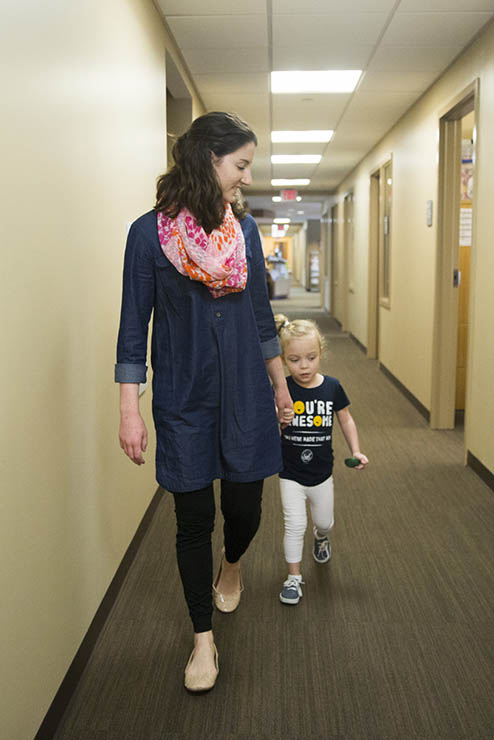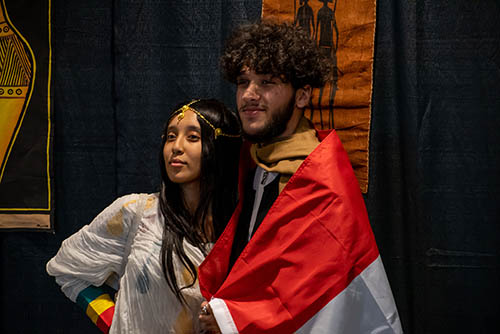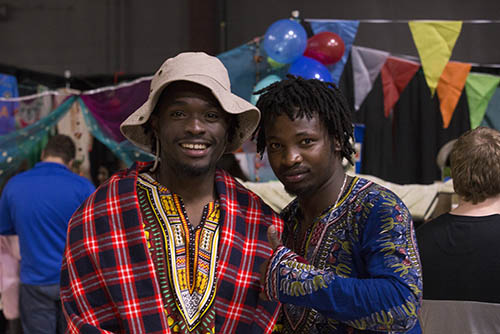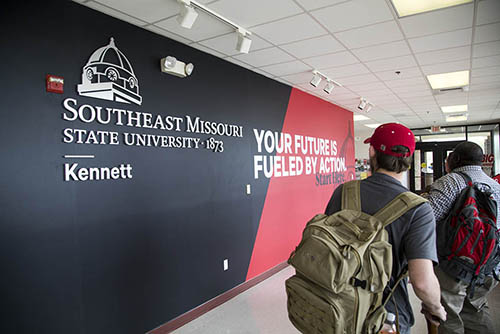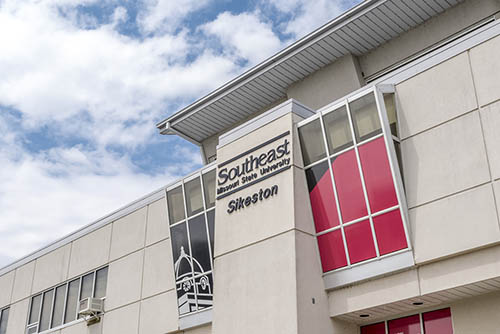Making Progress
Continue to main contentDecades of courage punctuated by dedicated efforts to advance, make amends and seek new opportunities are woven throughout the Southeast narrative. From physical campus enhancements to our social landscape, the institution is evolving.
The first African American students enrolled at Southeast in 1954. Those who have followed have continued to excel through challenges and adversity. In 1970, our first two international students enrolled. Today, Southeast’s tapestry is substantially more diverse, and the University's new Strategic Action Plan outlines a path to greater inclusivity.
While work remains, the institution continues making vital strides. The winds of change led to the retirement of our longtime “Indian” and “Otahkian” Native American nicknames in 2004, and we embarked on a new tradition in 2005 as the Redhawks. We also have introduced a Black Faculty and Staff Alliance, Diversity Peer Educators, an LGBTQ+ Employee Alliance and events showcasing the people and cultures represented here.
With dialogue, we continue to seek common ground, and we are proudly making progress.
Removing Barriers
-
The Talking Booth gave students, faculty, and staff the opportunity to have a conversation with someone outside of their race, religion, or culture. This video won a National AAF Award.
-
 The Autism Center is a community resource for families and individuals and helps them realize their potential.
The Autism Center is a community resource for families and individuals and helps them realize their potential. -
 Southeast has multiple events through the year for students from around the world to celebrate their culture.
Southeast has multiple events through the year for students from around the world to celebrate their culture. -
 Carpe Diem is Southeast's annual cultural celebration. We are home to individuals from over 60 countries and many cultures!
Carpe Diem is Southeast's annual cultural celebration. We are home to individuals from over 60 countries and many cultures! -
 We make the effort to go where you are. Regional campuses provide access to Southeast's programs that might otherwise be difficult to get to because of distance.
We make the effort to go where you are. Regional campuses provide access to Southeast's programs that might otherwise be difficult to get to because of distance. -

We embrace the words of the late Dr. Martin Luther King Jr. who said, “If you can't fly then run, if you can't run then walk, if you can't walk then crawl, but whatever you do, you have to keep moving forward.”
Houck Field was one of the most identifiable landmarks in southeast Missouri. For nearly a century, Houck Field has been the stage for some of our most cherished memories. Southeast faithful have celebrated unforgettable victories and witnessed the birth of professional sports careers. Southeast students and alumni have sung and danced with the Beach Boys, paid tribute to Chief Sagamore, reunited with friends and classmates, and tailgated with a future spouse. From game day to graduation day, the stadium served us well for 91 years. But now, the institution looks to the future with a heightened sense of urgency to rebuild this beloved landmark. A bold new vision for SEMO and this region began in December 2021 with the first phase of construction of a new Houck Field. Southeast officially broke ground Sept. 6, 2022, for the first phase of a new transformational Houck multiuse complex. The $15,978,000 contract includes the construction and replacement of the south sideline and grandstand of Houck Field as well as new seating, turf replacement, concession stands, restrooms, ADA access and associated HVAC, mechanical and other systems work. In addition to benefitting the football and soccer programs, the new facility will increase the fan experience as well. The full Houck Project will offer not only improved athletic facilities but also needed academic spaces. Work will continue in several additional phases as the University works toward completion of the comprehensive Houck Project.
In August 2017, Southeast opened the fall semester as a tobacco-free, smoke-free campus. This followed a policy revision by the Board of Regents, now the Board of Governors, in February 2017. Times were similar in 1880 when President Richard C. Norton implemented a catalogue of regulations on student conduct, including prohibiting the use of tobacco in or near the Normal Building.
Decades of courage punctuated by dedicated efforts to advance, make amends and seek new opportunities are woven throughout the Southeast narrative. From physical campus enhancements to our social landscape, the institution is evolving.
The first African American students enrolled at Southeast in 1954. Those who have followed have continued to excel through challenges and adversity. In 1970, our first two international students enrolled. Today, Southeast’s tapestry is substantially more diverse, and the University's new Strategic Action Plan outlines a path to greater inclusivity.
While work remains, the institution continues making vital strides. The winds of change led to the retirement of our longtime “Indian” and “Otahkian” Native American nicknames in 2004, and we embarked on a new tradition in 2005 as the Redhawks. We also have introduced a Black Faculty and Staff Alliance, Diversity Peer Educators, an LGBTQ+ Employee Alliance and events showcasing the people and cultures represented here.
With dialogue, we continue to seek common ground, and we are proudly making progress.
The African American experience at Southeast Missouri State University began more than 40 years ago with the enrollment of Roberta Slayton and Helen Carter. Both women were admitted after the Supreme Court ruled in Brown vs. the Board of Education.
The 1950s were a conservative period in our country. Southeast’s student population mirrored that of many other institutions across the country – all white. The Brown vs. Board of Education decision provided the impetus that led to the admission of African-American students at Southeast. Students were primarily left to fend for themselves. There were no support systems for those early students; and little if any social interaction or participation in campus activities. Students were very isolated and looked to the Black community of Cape Girardeau for emotional and social support. Those were difficult times for African American students, yet they continued to enroll, persevere, and graduate.
The 1960s was a time of the Civil Rights movement, Vietnam, and civil unrest. African-American student enrollment and graduation rates started to increase in 1963. It was during this period that African-American athletes were recruited for the teams of Southeast. Although Ron Staton became the first African American athlete in the 1950s; Curtis Williams was the first African-American athlete to distinguish himself in basketball and track in the 1960s. Walter Smallwood and Mike Smith were the first African-Americans to play football at Southeast. Walter set several school and conference records as a football player as did Curtis in basketball and track. In the physical education department, Emanuel Balland was the first African-American graduate assistant.
The assassination of Martin Luther King stunned the nation and campus. This event brought together the Southeast African American students to honor Dr. King. A eulogy was given by Herman Williams, one of the student leaders at that time.
Southeast Negro Activity Council 1968
In 1968, Carl Nelson and other students formed the Southeast Negro Activity Council (SNAC). This organization was officially recognized by the University in 1969 when Gwen Shields was its first president. SNAC was the first formal support network for African-American students.
By the end of the sixties, African-American student enrollment was approximately 70 with many of them being athletes. Students were primarily from St. Louis, Cape Girardeau, and the Bootheel of Missouri.
The 1970s witnessed the emergence of Black consciousness. SNAC became the Association of Black Collegians (ABC). This industrious group began several African-American celebrations including Black History Month and the Black Ball. Dan Wimberly created the Ebony Affairs program which was aired on the campus radio station. Steve Clay wrote for the Capaha Arrow, the campus newspaper. Black Greek organizations began with the founding of Alpha Phi Alpha (Xi Gamma chapter) in 1979.
African-American students began participating in more campus-wide organizations i.e., hall councils, Student Activities Council, student government, and academic clubs. Sandra Hendricks began a tradition of African-Americans performing with Terpschorie. African-American students became cheerleaders were on the pom-pom squad, Linda Branion, and played in the Golden Eagles marching band.
African-American faculty and staff were hired towards the end of this decade. Mr. William Thompson was one of the first African-American faculty hired in 1977. Charles Taylor was the first African-American graduate teaching assistant, with the Department of History. Dr. Edward Spicer hired as special assistant to the president, emerged as a significant role model and advocate for equality and diversity. His efforts and support of the students brought forth many changes on campus. Jackie Ayers and Peter Daniels both Southeast graduates began their careers in student services here. Rochell Smith was on the staff in the Nursing Department.
The African-American student enrollment was approximately 200-300 students during this time. Eighty (80) students graduated in 1972. This was the largest graduating class of African-American students in Southeast’s history. Herbert Daniels of Cape Girardeau (class of 1975) was of of the first African-American students to make the dean's list. Beverly Logan of St. Louis (class of 1978) also made the dean's list.
I Remember...
The hill … hanging out at circle in front of Towers … the jock house on Sprigg … parties at the white house … Sylvester and the dance at memorial … Bid Whist at the UC between classes … the home run that Joe Williams hit at Capaha Park … Dr. Spicer … how the Black of Cape took us in … our basketball team going to the national championship … Herman Williams speech after the murder of Dr. Martin Luther King … Alpha parties … Cedric (Kyles) before he became the entertainer … kickin’ it in the Graystone with the Phi Beta Sigmas … making the Deans Honor Roll … meeting Alex Haley at President Stacy’s home … working in the cafeteria … singing in the choir … dormitory life … the Black Ball … Biology … the campus Million Man March … Greek Step Shows … going to an 8 a.m. after partying all night … meeting my future wife … making the adjustment to being on my own … graduation day … our ABC meetings … the Alpha death march … classes in Academic in the winter … basketball in old Houck … the way our campus looked as the seasons changed … the friends I made … cramming for finals … Homecoming and the parade … Michael Davis…
African-American enrollment increased to nearly 800 students during this decade. Many students were recruited from the St. Louis area. While this enrollment was the largest to date, a tension between African-American rural and urban cultures began to emerge. This unexpected adjustment did not stop the students from socializing together, expanding organizations, and succeeding academically.
Alpha Kappa Alpha (1981) and Delta Sigma Theta (1983) sororities came into existence in the 1980s. Phi Beta Sigma (1986) fraternity was a very active group on campus. Kappa Alpha Psi fraternity and Omega Psi Phi interest group began. Greek step-shows became a homecoming tradition.
The St. James Choir later known as the Black Fellowship Mass Gospel Choir was popular in the Cape Girardeau and University communities. Umoja, an organization to promote Black Unity, strengthened the African-American student community.
The students of the eighties had many talents. The men's and women’s basketball and track teams were highly successful due to significant contributions from African-American student-athletes; Pat colon, Otto Porter, Jewel Crawford, and Terry Mead to name a few. The men’s basketball team won the MIAA championship and were nationally ranked. Cedric Kyle, a.k.a. “Cedric the Entertainer” and Joe Torrie, attended Southeast during this decade. ABC brought celebrities such as Alex Haley, Julian Bond, Dick Gregory, and Shirley Chisholm to the Southeast campus to help commemorate Black History Month. The first campus-wide Dr. Martin Luther King Jr. Breakfast was held in 1984.
Samuel Hylton in 1987 became the first African-American appointed to the Southeast Board of Regents.
This decade witnessed leadership in mainstream student organizations. Derrick Hudson was the first African-American elected to student government president. Colby Potts and Karen Price won the Southeast Man and Woman of the Year award. African-American alumni began sending their children to Southeast.
Monique Maxey was one of the first African American Governor’s Scholars. Denise Leonard was the first African-American female graduate student in the College of Science and Technology. Trent Ball graduated from the Education Administration and Counseling master’s degree program with Academic Distinction (4.0 GPA). The first four Heartland Alliance for Minority Participation Scholars (scholarships for Science and Technology) enrolled in 1997.
The community lost an important hero with the sudden death of Dr. Edward Spicer. Drs. Paul Keys and Shirley Stennis-Williams, the first African-American Deans; Dr. Kimberly Barrett, the first African-American Dean of Students; and Dr. Leonard Clark, Assistant to the President, hold key leadership positions. Patricia Washington, a Southeast Alumn, was the first African-American woman appointed to the Board of Regents in 1994. Mr. Harry Schuler worked with students to create Ebony Players and expand the Black Fellowship Mass Gospel Choir. Schuler was instrumental in the creation of the successful TRIO programs on Southeast’s campus. His efforts enhanced the retention and graduation of African-American students.
African Americans continued to succeed despite the tremendous decline (less than 400 students) in African-American enrollment. Students responded to this problem with organized, pro-actions. Danielle Carter, Tiffany Ford, Shawn Harris, and other African-American students, made use of an opportunity to work with Southeast’s then-new President, Dr. Dale Nitzschke, to create the Minority Student Programs Office in 1996. This office, under the leadership of Trent Ball, has given students the foundation needed to connect to the greater University community.
The President's Task Force on Diversity Education was formed in the aftermath of protests that took place in Ferguson, Missouri in fall 2014. The 34-member Task Force was comprised of students, faculty, and staff at Southeast Missouri State University who collaborated to devise strategies to strengthen diversity education and enhance the cultural competence of the University community. The Task Force was initially formed by the president to consider the underlying issues that led to the protest events in Ferguson and elsewhere; and to make recommendations to improve diversity education at Southeast. A final report and recommendations of the Task Force were shared withthe Administrative Council, a representative body of the university's faculty, staff, and students, on December 22, 2015. The council discussed the prioritization of the recommendations and endorsed the report.
It is the vision of the Task Force that, "Southeast Missouri State University will be a campus community where individuals from all backgrounds will feel welcomed, respected, and included and where our campus community engages in best practices to promote cultural competence and inclusion in all aspects of our work."
Diversity Task Force Progress Report
On January 27, 2016, President Carlos Vargas and members of the task force participated in two open forums to share the final report and recommendations. Students, faculty, staff, and community members were invited to provide feedback on the report as well as suggestions for its implementation.
On Friday, February 26, 2016, the final report, and recommendations of the President's Task Force on Diversity Education were shared at the Board of Regents' meeting. Dr. Debbie Below, co-chair of the Task Force, presented an overview of the summary and final recommendations of the report, indicating how important the work of the Task Force was in identifying, addressing, and engaging not only the Task Force members but the overall University community in conversations around best practices in promoting cultural competence and inclusion in all aspects of the academic experience. Diversity Task Force members, including co-chair Dean Morris Jenkins, Bruce Skinner, Hamner Hill, Sonia Rucker, Brady Barke, and Kevin Windham were introduced and commended for their assistance and participation in this project.
Dr. Below shared next steps including plans for the Executive Staff to begin a review the final report and recommendations in more detail beginning March 31, 2016. The final report contains nine general recommendations that are supported by 39 specific recommendations. President Carlos Vargas indicated the importance of having each member of the Executive Staff consider the recommendations carefully and to offer additional thoughts, insight, and suggestions in support of this effort. In early April, members of the Diversity Task Force and the Executive Staff will come together in a joint meeting to confirm and if needed, to clarify, the intent of the recommendations, giving each one due consideration and investigating the best possible paths for establishing attainable timelines for successful implementation of the final recommendations.
The Board commended the work of the Task Force members and Dr. Vargas' leadership, indicating their support and commitment in moving Southeast Missouri State University forward as a community which is committed to providing a student-focused, culturally responsive learning environment that promotes inclusion, diversity, and equity throughout all aspects of the University community.
On April 30, 2016, the spring meeting of the Southeast Alumni Association Board of Directors will be held in the Kem Statuary Hall of the Wehking Alumni Center. Dr. Debbie Below and Sonia Rucker are scheduled to present an overview of the final report and recommendations of the Task Force Report. The Alumni Board members will be invited to provide input and feedback on the report as well as indicate any relevant next steps pertaining to alumni participation in successfully implementing the recommendations.
On July 19, 2016, Dr. Vargas approved and appointed members to the University Equity and Inclusion Committee, one of the University’s current standing committees under the Administrative Council. On August 18, 2016, the Administrative Council approved a proposal to revise the name, charge, and membership of the University Equity Issues Committee to the Equity and Inclusion Committee. This Committee will report to the President and will be co-chaired by Ms. Sonia R. Rucker, Coordinator of Institutional Equity & Diversity, and Dr. Hamner Hill, Professor of Philosophy and Religion and Chair of the Department of Political Science, Philosophy and Religion. The members of the President’s Task Force on Diversity Education recommended that this standing committee be utilized to monitor institutional progress toward the goals and recommendations set forth in the Final Report and Recommendations of the Diversity Task Force submitted on December 20, 2015. The University Equity and Inclusion Committee will play an integral role in further developing the University’s vision for the creation of a campus climate and culture which is inclusive, civil, engaged, and welcoming.
To ensure diversity and a broad representation of campus constituents who would be able to actively contribute and continue to provide guidance and thought leadership on these important matters, Dr. Vargas requested nominations from each college, CTS, Professional Staff Council, and representation from both the undergraduate and graduate student populations for appointment to this committee.
